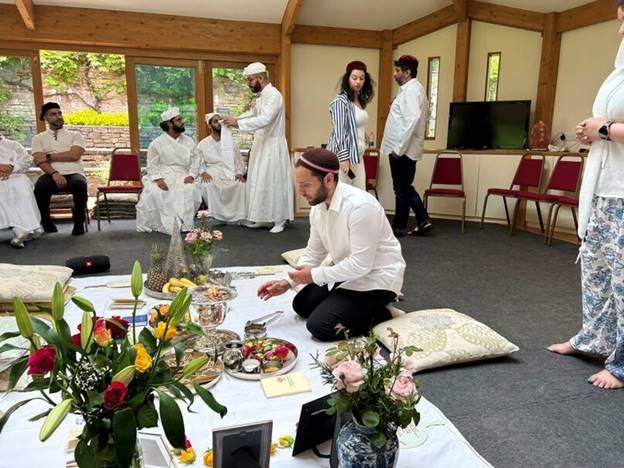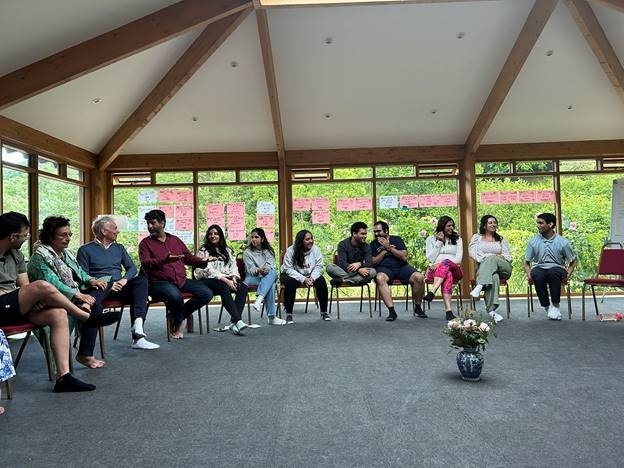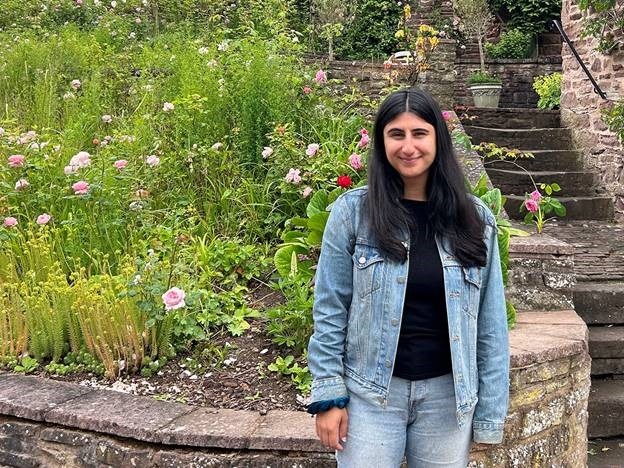Youth from the ancient faith campaigned to fund an interfaith center in England to promote the goals of inclusivity and interorganizational communication.
World Zoroastrian Youth Leaders Forum youth leader Fravash Chothia after the Jashan, or blessing, prayer ceremony, which was livestreamed to the broader Zoroastrian public on May 26, 2024, in Gloucestershire, England. (Photo by Dina Katgara)
June 11, 2024
Article By Dina Katgara | Religion News Service
GLOUCESTERSHIRE, England (RNS) — At the beginning of June, 29 youth leaders from the global Zoroastrian religious community wrapped up 10 days of convening at the Asha Centre, an interfaith retreat outside of Oxford, for the second World Zoroastrian Youth Leaders Forum.
“This is an opportunity for me to bring members of my community to this paradise,” said Sanaya Master, who founded WZYLF in 2018. “Every person that comes to Asha is affected quite deeply, and spiritually, it helps them sort of reconnect with their innate self.”
From May 24 to June 2, youth leaders from countries such as India, Canada, England, the United States, Iran and the United Arab Emirates collaborated to identify three main goals: empower youth mobeds, or priests; establish a new organization to streamline youth initiatives globally; and support the Asha Centre’s continuity as a hub for Zoroastrians.
The Asha Centre was founded in 1996 by Zoroastrian leader and human rights activist Zerbanoo Gifford. Its origins and history exposed interfaith youth groups to the teachings of Zoroastrianism, the first monotheistic religion — it originated in Persia about 4,000 years ago — and its maxim: “Good thoughts, good words, good deeds.”
Piran Tarapore, far left, sits next to Zerbanoo Gifford in the sharing circle on May 27, 2024, at the Asha Centre in Gloucestershire, England. Behind the group is one of their initiatives to fundraise to save the Asha Centre. Each youth leader volunteered to share a talent for a raffle. (Photo by Dina Katgara)
“I can’t think of a better place on earth,” said lawyer Shazneen Munshi, who just completed her 14th visit to the center. However, it could also be her last. Britain’s departure from the European Union in 2020 stripped the center of its funding. The Asha Centre used to be the main provider in England for the European Union’s educational Erasmus plus program. Now, the youth are fundraising to solidify the center as a Zoroastrian home base to improve and connect the community globally.
Munshi, who works in parliamentary policy in London, teaches Zoroastrian religious education classes to children and at 36 is the youngest member on the board of the Zoroastrian Trust Funds of Europe. Like other young Zoroastrian leaders, she often struggles with feeling unheard or overlooked but is excited to see more young people stepping up.
“I don’t think there’s anything else in life that fills me with so much passion and joy,” Munshi said. “We’re quite a small community and I feel this kind of responsibility to do everything I can to make it better for everyone and keep our faith going.”
While some WZYLF participants such as Munshi are steeped in the community, others, like Piran Tarapore from Mumbai, India, are dipping their toes back into the religion after years away. On the third day of the forum, Tarapore, sitting in the group sharing circle, detailed his struggles growing up queer in India. After the session, each youth leader engulfed him in a heartfelt hug.
“Once I had that reassurance from my friends and family, I didn’t really care about the community,” Tarapore, 26, said. “When each one hugged me one by one, it made me feel like I’ve found my community within the community.”
After he came out in his early teen years, Tarapore felt ostracized by his baug, or a colony of apartments for Zoroastrians. When he started a communication business called Savoir, now Point Of, in 2021, Tarapore was pleasantly surprised to find that many of his main supporters were Zoroastrians. Only after separating his emotions about the Zoroastrians he grew up around from the religion itself did Tarapore decide to apply for the WZYLF.
“After this experience, I’m looking at the community through a different lens,” Tarapore said. “I like seeing the youths’ drive and motivation to make change.”
There are many internal debates within the Zoroastrian religion, including about intermarriage, women as mobeds and same-sex marriage. The youth group did not debate these issues specifically but rather championed freedom of personal opinion through the Zoroastrian idea of Vohu Manah, or “the good mind” in Avestan, the scriptural language of the faith. Munshi said everyone has a choice between good and bad and the freedom to think critically.
“As long as you use your mind and decide what is right or wrong for you, that’s fine,” Munshi said. “And everyone should respect that.”
On the forum’s final day, the youth group stood at the front of the Peace Pavilion to present its conclusions to established Zoroastrian leaders from the World Zoroastrian Organization, the Zoroastrian Trust Funds of Europe, the Federation of Zoroastrian Associations of North America and other organizations.
Kimiya Shahzadi, 29, is training to be a mobedyar, or priest assistant, under the Iranian Mobed Council and wants to unite young mobeds globally through education initiatives and open lines of communication.
Kimiya Shahzadi in Gloucestershire, England. (Photo by Dina Katgara)
Shahzadi, along with three young Zoroastrian mobeds, led the room of the ancient religion’s established leaders in an opening prayer. The hum of the ancient Avestan prayers mellowed some pre-presentation tensions.
The group went into detail about plans for a new connected youth group and plans of action to achieve their goals. Shahzadi said that these innovative ideas for inserting youth voices into leadership and championing inclusive mobedyars would not have been possible without the Asha Centre.
“I don’t want to lose this place,” Shahzadi said. “I want everyone to see it. I want to have kids to see it and my grandkids see it.”
The group presented the online donation portal and announced that it had already personally raised over 8,000 pounds (more than $10,000) so far.
After fielding questions, the group led a standing ovation for Gifford and her creation of the Asha Centre in a shared hope that it will continue to be the home base for the next generation of Zoroastrian leaders to advance the community into the future.



